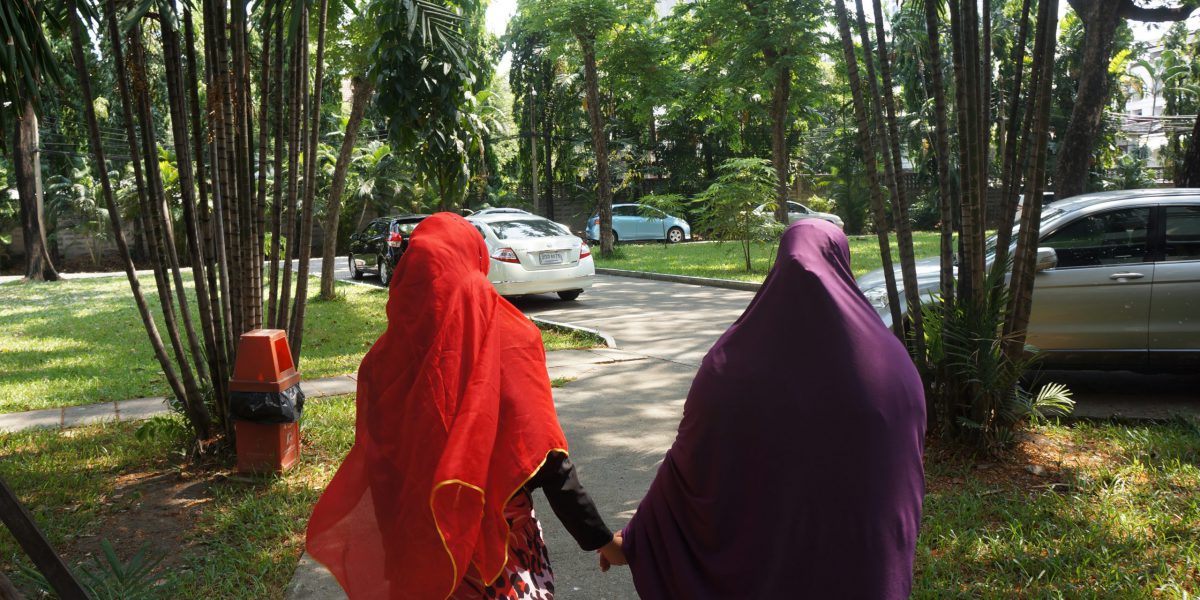Thailand: Doing what is possible in Bangkok
04 May 2016|Nick Jones

Bangkok, Thailand 4 May 2016- Iman was banging on the desk, crying about the circumstances she and her child had been put into. Pattarada Rittang said, “It is tragic what has happened to you but think of your child next to you, focus your energy on doing what is possible.”
“It was a hard day and hard to say those words to a distraught mother who is my client”, she later reflected.
Pattarada Rittang, a female Thai national, has been working with refugees for the past five years in Thailand in urban and camp settings. She is a caseworker with JRS in the Urban Refugee Program, a program funded with a U.S. State Department grant from the Bureau of Population, Refugees, and Migration.
“Urban settings are more stressful and the stories of each asylum seeker are more complicated due to the differences in each case in comparison to my experiences in the camps near Mae Sot.”
She continued, “Bangkok is more difficult, there is no safe place for them here in the capital. I feel refugees are safer in the camps.”
Bangkok is going through a transition under the current government. The priorities of security and a review of immigration policies have diminished protection spaces in Bangkok thus leaving little opportunities for the approximate 9,000 asylum seekers and refugees here to carve out any sense of a normal life.
JRS recognizes the life of a refugee is not a normal life and we provide accompaniment as a form of discernment to guide our work with asylum seekers.
Iman is an asylum seeker from Somalia and a client of JRS. After her abusive husband divorced her, kidnapped her eldest child and threatened to take her youngest as well, she was distraught and left with little options in war torn Somalia.
Iman tells us “He stole my daughter! He cheated me out of being a mother, out of a family!”
She recounts how her father had prearranged her marriage to a Saudi man, the man 27 years her senior. Iman recalls, “He forced me into everything, whether it was in the bedroom, kitchen, everywhere…he forced me into everything.”
After the husband went back to Saudi Arabia, taking the eldest daughter with him, Iman’s father passed away. It left her with no viable means of safety or dignity and she fled Somalia.
“I wanted to protect my youngest daughter from him and from others. I had no where to go and the only family I had left was gone when my father passed…so I fled”.
She was smuggled by an agent into Thailand and was cheated out of all the money she had. The smuggler got her out of Somali through Ethiopia on to Thailand. Iman said, “I didn’t know I was coming to Thailand.”
Initially, she was angry and depressed and shared feelings of extreme vulnerability. She approached JRS in her dire circumstances to seek assistance, both financial and psychosocial.
“I came to JRS the first time and I was crying, I couldn’t stop crying, I didn’t know what to do. They helped me stop crying and to stop feeling depressed through the group classes”, Iman recalls.
“Referring her to the psychosocial team for the stress reduction classes was very important. It allowed me to do my casework and recommend her young child go to the Bangkok Refugee Centre (BRC) for school while ensuring she built community contacts to find a job as we provided financial assistance for housing and food” Rittang said.
Her daughter’s acceptance into BRC allowed her to create a routine around her daughters schooling and her own stress reduction classes.
Her daughter has since graduated BRC and has been accepted into a Thai school. Speaking with Iman’s daughter, she said, “I like going to school, my favorite subject is Thai language! I love to study and soon I will go to level 4”.
JRS has since extended assistance to ensure the daughter continues her education and the mother continues to look for stable income. She has shown initiative by taking part in a JRS livelihood pilot group and works from time to time as cleaner, maid, and cook for an Arabic family.
“I am happy, for now, as JRS helped me more than people in my own country, they helped me and enabled me to pay for my daughters schooling!” Iman said.
Iman has taken significant steps since her arrival to do her best to make a life here. She has demonstrated her desire to be financially independent, her self-esteem is increased, and her daughter continues to be a central priority in her life.
She is focused on doing what is possible.

